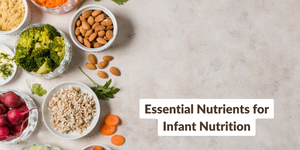
What is formula milk?
Infant formula is a dried milk powder that aims to provide the child with the goodness of a mother's milk with added vitamins and minerals. The caregiver simply needs to mix the formula with room-temperature boiled water before feeding the baby. While most formulas are derived from cow’s milk, there are other various options like soy-based formulas, hypoallergenic, lactose-free and other specialised formulas on the market today too for babies with different requirements.When choosing a particular type of formula, it is important to seek your paediatrician's guidance about which formula suits your baby best.
When to switch to formula milk?
Parenting is hard, and so is a child's weaning journey. Deciding the best time to gradually transition to formula feeding can be a slow process, but certainly a fruitful one. That said, it is essential to note that even if you are switching to formula, it is not advised to immediately cut off breastfeeding.
The American Academy of Pediatrics recommends that infants be breastfed exclusively for the first six months of life, then continue breastfeeding for a year while introducing complementary solid foods.
Do not rush to introduce formula into your baby's diet. Allow them to get used to the taste as well as the texture. This is for both exclusive and supplemental feeding.
How Do We Choose These Best Baby Formulas For 6-12 Months
The BabyG team conducts thorough research on all the products recommended in the list through their personal experience as parents and experts and the community experience of over 300k parents who use the BabyG early development app. During the research process, we looked at reviews around real usage of the product, quality, rating, pricing, safety, and overall value as per the use cases of different parents.
To choose the best baby formulas for 6-12 Months, we further detailed our research to look for formulas that include ingredients that are fundamental for your baby's overall growth. In addition, they are evaluated based on their consistency, ease of feed, ease of digestion, the scope of comfort from colic and if they are devoid of any artificial colour.
By doing so, our team has ensured that we provide our community with reliable and high-quality product recommendations. Our mission is to ensure that our parenting community always make informed, expert recommended and well researched decision to give the best development and products to their little ones.
Top Rated Milk Powders For 6-12 Months Babies in India
1. Best in Spray Dried formula: Nestle LACTOGEN 2 Follow Up Formula Powder
Here’s a top contender in our formula search. With the power of essential vitamins and minerals, this product proves to be a great source of nutrition and is packed with amino acids and other components that support growth and development. The spray-dried formula is whey-based, which is best for younger babies since it is easily digestible.
While nothing can replace the nourishment of breastmilk, Nestle LACTOGEN 2 contains omega fatty acids that aid in brain development. This formula milk is said to be delicious and is trusted by parents all over the country.
Suitable Age: 6-12 Months
Pros: Value for money, Iron-rich formula, Good Quality.
Cons: Reported in causing constipation in some babies.
2. Best with benefits of DHA: Enfamil A+ Stage 2 Follow Up Formula
Second on our list is the Enfamil A+ Stage 2 Follow-Up Formula. The milk powder contains the expert-recommended levels of DHA, choline, and iron, which altogether are a powerhouse in an infant's brain and eye development. The easy-to-digest formula includes dietary fibres to help with constipation, keeping the baby satisfied and content.
The combination of filling and healthy formula is also said to help with colic in babies. While it can be a bit on the expensive side, the immune-building product is worth the cost.
Suitable Age: 6-12 Months
Pros: Value for money, Fibre blend support growth of good bacteria.
Cons: Might cause gas to some babies.
3. Best with Goodness of Vitamins: Nestle Nan Excella Pro 2 Follow-Up Formula Powder
Here's a formula packed with vitamin A, C and D with the powehouse of bone development, calcium. This is a partially hydrolysed whey protein formula that helps reduce intolerance. It is fortified with DHA that helps stimulate visual activity and brain development. And as an added bonus, it also contains choline, which is great for healthy cell function. All in all, the formula is vegetarian and light on the tummy.
Suitable Age: 6-12 Months
Pros: Delicious, High-Quality.
Cons: On the expensive side.
4. Best for Baby’s Immunity: Similac Advance Follow-Up Infant Formula Stage 2
Immunity-building is an essential part of healthy nutrition. Similac understands this. The formula is just what you need for your growing infant. It has a wholesome blend of nucleotides that helps in supporting immunity and gut health.
In a whey protein concentrated formula, the company effectively leaves out palm olein oil in an effort to increase calcium absorption. It promotes bone, brain, and overall growth. What is not to love about this filling formula.
Suitable Age: 6-12 Months
Pros: Includes Choline, Iron and Omega 3 fatty acids.
Cons: Can be a heavy feed, Contains Lactose.
5. Best for Supporting Growth: Dexolac Stage 2 Follow-Up infant milk formula Powder
Your search for formula milk after 6 months with 36 essential nutrients ends here. Parents can rest assured that their infants' developmental needs will be fulfilled with this incredible formula. Its formulation contains all the key vitamins, minerals, and healthy fatty acids for the overall growth and nutrition of your little one. The powder eases colic and includes whey protein that helps in easy digestion.
Suitable Age: 6-12 Months
Pros: Promotes bone growth and Gut health.
Cons: Takes a while to dissolve, Might form clumps.
6. Best For Easy Digestion: Nestle NAN PRO 2 Follow-up Formula Powder
We are sure you have heard of this one before. The easy-to-digest formula contains all the essentials like calcium, iron, folic acid, an array of vitamins and our favourites, DHA and ARA.
The nan milk for 6–12 months includes added probiotics that help your little one's gut health and prevent allergies with its good bacteria formation abilities. Made with whole whey protein, Nestle NAN PRO 2 is truly a filling feed.
Suitable Age: 6-12 Months
Pros: Supports Brain and Eye development.
Cons: On the expensive side.
[Related - Best Baby Milk Powder Brands]
7. Best with Benefits of Lactose: Aptamil Gold 2 Follow up Infant Formula Powder
Babies are always ever-hungry. And you need the best energy powerhouses to sate the hunger. This is the optimal milk powder for 6 months baby, with 100% lactose and whey protein. Lactose is a simple carbohydrate that not only promotes a healthy digestive system but also helps with increased mineral absorption.
Aptamil Gold 2 has all the important nutrients with the addition of nucleotides and beta-carotene, which boost immunity and cognitive function.
Suitable Age: 6-12 Months
Pros: Filling and light on the stomach.
Cons: It may contain soy.
8. Best in Natural: MMS Follow Up Formula Milk
You could say we saved the best organic for last. MMS Stage 2 Formula Milk has hydrolysed whey protein, which is gentle on an infant's stomach, aiding in an easier digestion. The addition of nucleotides, vitamins, and fatty acids aids in all-around development.
The formula is preservative, artificial colour, and flavour free. The product also has added taurine and inositol, which support brain development like long-term memory.
Suitable Age: 6-12 Months
Pros: No added Sugar, Helps weight gain
How To Choose The Best Formula Milk For 6 to 12 Month Baby?
Now that you have decided to make the switch, and have a lot of options at your disposal, selecting one that will suit perfectly with your child is a herculean task. Okay, not as dramatic, but certainly important. Here’s how to choose the best formula milk For 6 to 12 Month Baby:Consult your paediatrician: Talking to your doctor is the first and most important step in expanding your baby's diet. They'll get you organised from the ground up. They are the best judge about the formula's components and will help you steer clear of problems, such as food allergies, that could arise from making ill-informed decisions for your baby. It is also integral to discuss with your baby's paediatrician before switching to a new formula.
Examine the ingredients: Ingredients are a key factor in determining the optimal food for your baby. While the formula industry is heavily regulated with strict guidelines to nudge the brands toward creating the best for your baby, it is important to thoroughly go through the contents. Many infant formulas contain great supplements like nucleotides, probiotics, or DHA and ARA to differentiate themselves from their peers. Few among the selection may also have a whey protein or a soy base, choose one that meets your baby's dietary requirements.
Convenience and cost: Gradually, the cost of formula can add up, and get quite heavy on parents pockets. So, it is wise to bear in mind the frequency of the feeds as well as the cost. Along with the nature of the feeding, which could be supplemental or exclusive. Choose a product that fits your budget while meeting your baby's needs.
In essence
Starting with the ones recommended by your paediatrician, and based on your child's reaction to the products, you'll soon be able to categorise and select the ones that will best suit your child. Trials and errors are a part of the journey. Don't let the shiny packaging and clever advertising get to you. Parents are the best judges. Reach out to one in your network if you need primary guidance. Happy Parenting!
Want to tap into the knowledge of all things baby nutrition and development? Head to the BabyG App today!
Reference:
- Healthline: Choosing the Right Baby Formula.
- The American Academy of Pediatrics: Breastfeeding and the Use of Human Milk.
- CDC: Infant Formula Preparation and Storage.






















amazing. thanks for summarizing, love the faq and overall information for each formula…even doctors don’t tell us so much.
I got such good information on this topic, it’s a very interesting one.